Caudillos and Caciques
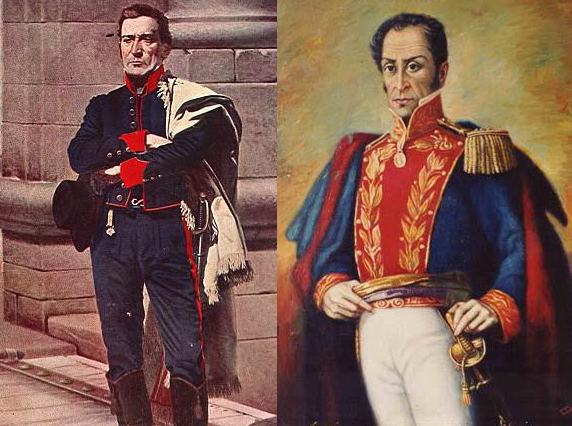
José Gervasio Artigas (left) and Simón Bolívar (right), liberators and national heroes of Uruguay and Venezuela, respectively.
Many are the men that fought for independence, freedom and democracy in Latin America, the values Unitedstatians invoke so often and currently fail to live up to. José Gervasio Artigas, the founding father of my nation, was inspired by the noble ideas the US was founded on and particularly loved its constitution. The similarities between the flag of the US and the Uruguayan flag are no coincidence. Let us not forget, the US was the first nation to ever break free of European oppression, and its constitution was among the most modern throughout America. Simón Bolívar, the personal hero of Hugo Chávez and one of the first visionaries of a united Latin America, a “patria grande,” is the current undeniable hero of Latin America and his portrait is always featured in summits of UNASUR and CELAC. These men are what we call “caudillos,” in Spanish, a word that doesn’t have a specific translation in English, but could be translated as supreme chief, a figure of authority and power usually of military origin with positive connotations, as is the case of liberators (Spain is the exception, as the word is associated with Franco and thus not viewed positively). In Peace Walker a similar term is used, “Cacique,” meaning the chief of a native tribe, and also meaning an owner of a large “estancia” (ranch). It is invariably a title of great respect no matter how you use it (again, except for in Spain, where it basically means ruthless oligarch). The term cacique is thrown around in Peace Walker an awful lot, and characters often call Big Boss this.
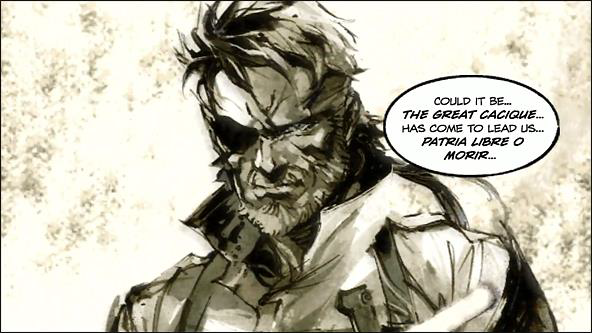
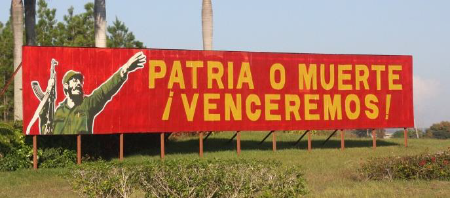
A billboard in Cuba depicting Fidel holding an AK-47 rifle, with the motto “patria o muerte, ¡venceremos!” meaning “fatherland or death, we will win!”
Flag of the thirty-three Orientals, a Uruguayan revolutionary group led by Juan Antonio Lavalleja against imperialist Brazil. The actions taken by this group culminated in the founding of Uruguay as an independent nation in 1825. The flag has the motto “freedom or death,” the national motto of Uruguay.
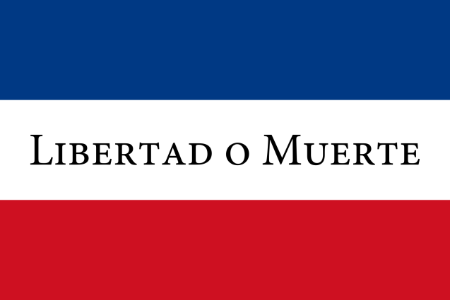
Flag of the thirty-three Orientals, a Uruguayan revolutionary group led by Juan Antonio Lavalleja against imperialist Brazil. The actions taken by this group culminated in the founding of Uruguay as an independent nation in 1825. The flag has the motto “freedom or death,” the national motto of Uruguay.
There is no doubt about it. In the Metal Gear series, Big Boss is a caudillo, and this is the image Kojima aimed at giving his character, setting him apart from Solid Snake. He inspires respect, and his name means power and freedom, inseparable. This is not limited to just Peace Walker. Remember how Sniper Wolf spoke of him shortly before dying, calling him Saladin? Just like Che, Big Boss is either hated with passion or loved with utmost loyalty. Think of the US government and Liquid Snake hating on him, and then go back to Sniper Wolf and the Sandinista guerillas. He’s a highly divisive figure as Che, Fidel or Chávez can be, and certainly an icon deserving of respect whether you agree with him ideologically or not.
Aside from the word cacique, General Sandino’s motto “patria libre o morir” (free fatherland or death) is often uttered by characters in Peace Walker. In Latin America, many of our countries’ lemas nacionales (national mottos) include these lines or similar, in relation to the will to break free of colonialist oppression. The motto of Cuba is “patria o muerte” (fatherland or death) while the motto of my country, Uruguay, is “libertad o muerte” (freedom or death). These mottos may seem overly revolutionary and even violent to North Americans and Western Europeans, but they emphasize the anti-monarchic and anti-colonialist nature of our nations. Also, the quote “hasta la victoria siempre” (until victory, always) by Che Guevara is prominently used throughout Peace Walker. The phrase “In a revolution one wins or dies, if it is a real one” is referenced after the tutorial sequence in Peace Walker, when one confused soldier (after training) asks Big Boss “but in revolution, doesn’t one triumph or die?” to which Big Boss replies “we don’t do either.” Although ambiguous and detached, this in turn is similar to a quote by Che; “one does not live by celebrating victories, but rather by overcoming defeats.”

We also see that aside from caudillos of the 18th and 19th centuries, Latin America has been riddled by leaders enjoying large cults of personalities throughout the 20th and 21st centuries, certainly the legacy of our liberators. Domingo de Perón, Evita Perón, Fidel Castro and Hugo Chávez rose to popularity and power because they were willing to fight for those most unfortunate, for a world based on social and economic equality, in essence, “liberating” Latin Americans from a more modern form of oppression, that of the financial order imposed by the US.
Of these leaders, only Fidel Castro is still alive (by the time of writing this article). Fidel survived 638 assassination attempts by the CIA which included the stuff of legends such as exploding cigars. He has survived 15 Unitedstatian administrations and is still standing, still writing, still thinking and still inspiring Latin American society. Cuba’s status has changed noticeably too.
“It’s true that anything could happen, but let’s face it, at my age I don’t have much to lose” (…) “I know that something could happen to me, but it’s in the hands of God.”
Neglected by the US and its puppets and strangled by US sanctions, travel bans for Unitedstatian citizens and an economic blockade established in 1959, the Communist nation is now integrated into Latin American organisms such as UNASUR and CELAC much to the chagrin of the US, and superpowers like Russia and China have vowed to invest in it with modernization campaigns so as to take the island out of developing country status. The US is on the verge of sociopolitical and financial collapse, while Cuba still stands. It’s remarkable. One little island, in the face of the most powerful nation on Earth, which has defied it for 60 years is still standing and on the way to progress, a bright future ahead. And that’s not even the best part; most recently, Cuban-Unitedstatian businessmen and US politicians have started speaking out against the US economic blockade against the island due to the fact that they’re missing out on trading and commerce opportunities. The economic sanctions the US likes to impose in other countries (most recently Russia) to challenge their sovereignty and drag them towards sympathizing with Unitedstatian views, are clearly not shared by their own businessmen.

“It’s true that anything could happen, but let’s face it, at my age I don’t have much to lose” (…) “I know that something could happen to me, but it’s in the hands of God.”
Latin America has been on the news lately because of many reasons, but this one is of the most very important global figures; Pope Francis, of Argentine nationality. A Pope who refuses to ride in the shielded bullet-proof popemobile and in accordance to his faith, leaves his life at the hands of his god, a pope who criticizes the lavishness of the Vatican, who advocates for priests to get married, who punishes and denounces child abuse, who mixes in with the people instead of avoiding them and who says the same things regarding capitalism and the global world order that any Socialist would say. This is not your regular European Pope; this is a Latin American Pope, who has very much seen poverty first-hand and acknowledges what his role is regarding his faith and the economic reality of most countries.

Uruguayan President José Mujica in his VW Beetle.
But the Pope has not been the only Latin American to attract international attention for his progressive ideology and an austere lifestyle seemingly at odds with his occupation. The current President of Uruguay, José “Pepe” Mujica Cordano, former Tupamaro guerilla leader. Mujica lived a life full of action; he was apprehended by authorities four times, he broke out of prison, survived being shot six times and was eventually caught again and spent 14 years of his life in a military prison, where he almost went insane due to severely harsh psychological and physical torture and the effects of solitary confinement. But Mujica is not the great political figure he is just because of that; far from being an old glory, he rose to presidency in a democracy he fought for and currently lives in a humble farm because he detests the idea of living in the presidential palace, gives speeches to the people without bodyguards or armed state protection, donates 90% of his 12,500 $ monthly salary to charity and his only possession aside from his farm is an old VW Beetle from the ‘80s. He also detests ties and suits in general, preferring to dress casually. Needless to say, it is hard to believe that a man who reunites all of these qualities exists and this is the reason Mujica’s popularity has risen in Europe, a continent littered with center-left and center-right corrupt politicians who are slaves to the banks, and where people have become increasingly distrustful of politicians they do not feel represented by.
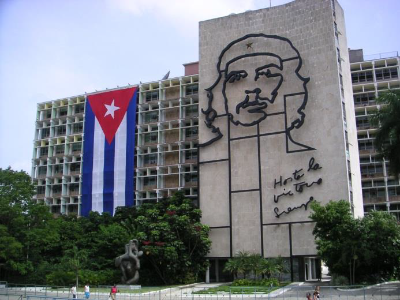
In Cuba and Argentina, gigantic murals adorn buildings with the faces of Che Guevara and Evita, who are considered national heroes.
Just like Che Guevara, all of these figures have risen to their popularity because they live coherently in accordance to the beliefs they preach and their reputations are transparent and devoid of stains. In the US there just aren’t a lot of figures like these, and those that are worthy of admiration are demonized or receive little attention. Martin Luther King Jr., Malcolm X, Rosa Parks and Angela Yvonne Davis come to mind, to name a few of the most prominent ones we admire internationally, who we get to know as symbols of social progress. Interestingly, two of them were assassinated for their views, two are women, and they are all black and left-leaning (with communist ties). It isn’t strange that 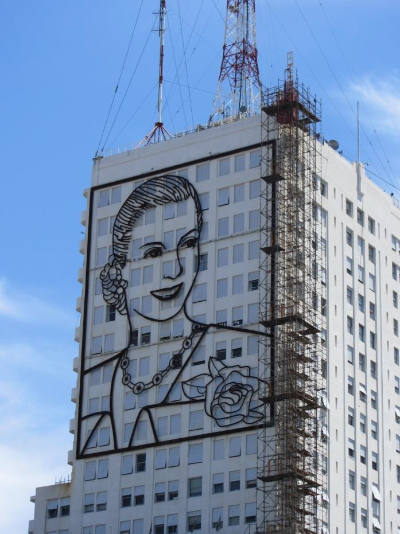 in the US those who fight for the rights of minorities, workers and the poor are forgotten or suppressed when considering the status of their decadent society and the general selfish mindset of the population. Let us not forget, and this what many Unitedstatian
in the US those who fight for the rights of minorities, workers and the poor are forgotten or suppressed when considering the status of their decadent society and the general selfish mindset of the population. Let us not forget, and this what many Unitedstatian
progressives complain about, that the US is a place where popularity is placed in front of ideology, where multi-millionaire film actors and businessmen become presidents and governors, and where it actually makes a difference whether the president was captain of the football team in his youth or not. But it’s not the fault of politicians either. The lack of empathy for the poor and the selfish, individual mindset of average citizens who do not wish to pay taxes for public healthcare and education certainly reflect their society, which is currently falling apart more than ever before. Just look at how many mass-shootings a year that are perpetrated by individuals driven crazy by the alienating society of Unitedstatian ultra-capitalism. This is a capitalist phenomenon that certainly occurs in many capitalist nations, but only in the US it occurs this often. Communist societies, on the other hand, are notably crime-free and people from former Eastern bloc countries often miss the peace, safety and stability of the communist eras (Romania being a very recent example, where a poll assured that more than 50% of Romanians missed Socialist elements from the Ceau?escu regime, same applies to former East Germany). In Cuba, for example, this is just the case; drug trafficking in the island is actually non-existent due to state intervention, something that is impossible to believe in Western societies ravaged by narcotics.
So, why does Latin America have this thing for idolizing politicians and caudillos, why do we have figures which we elevate to utmost holiness? The answer lies not only in our history of breaking free of colonialist oppression, but also in religion.

